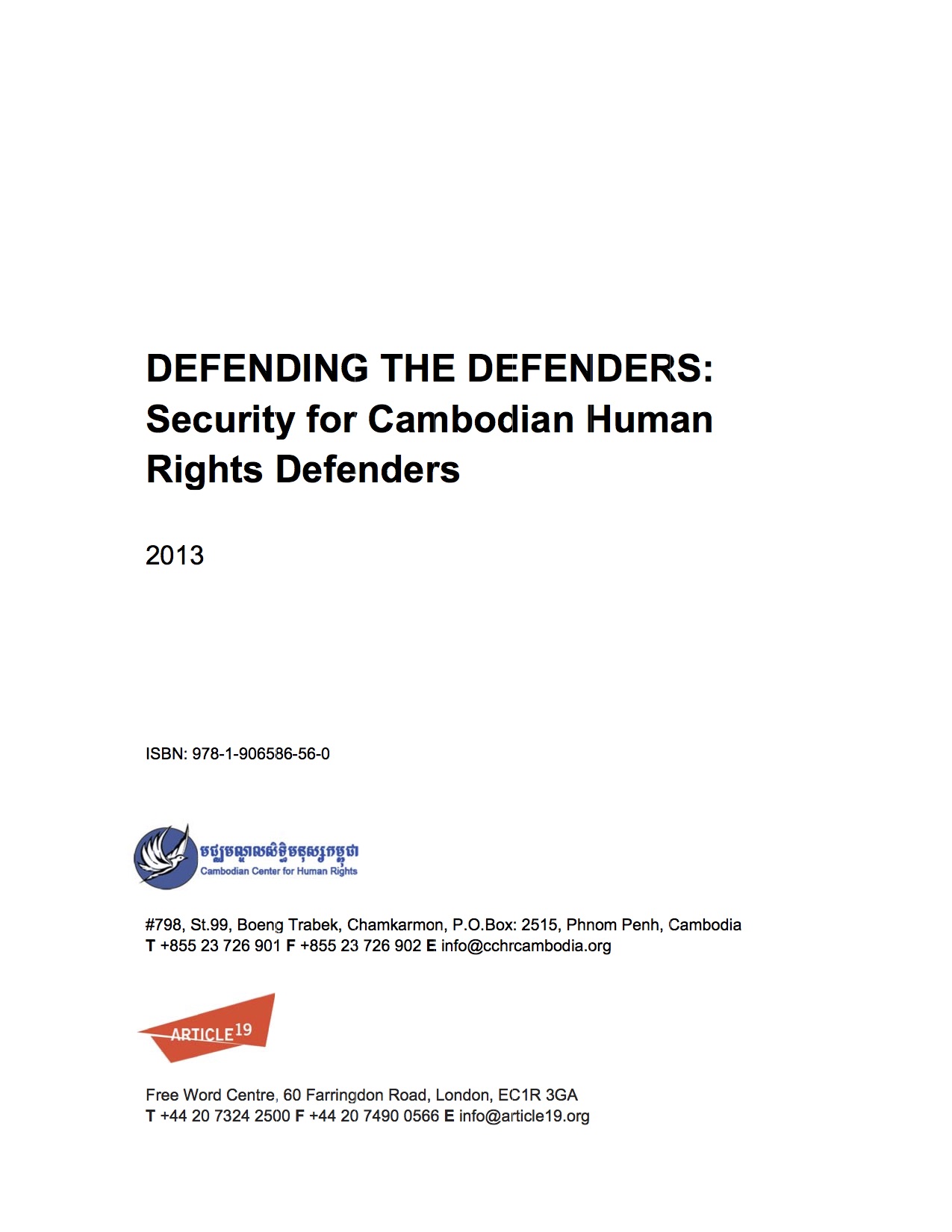
Defending the Defenders: Security for Cambodian Human Rights Defenders
Publication Year: 2013 / Sources: Cambodian Center for Human Rights (CCHR)The work of human rights defenders (HRDs) is invaluable for the overall realisation of human rights protection and promotion, and consists of gathering and disseminating information, advocacy, mobilisation of public opinion, empowerment and support of victims of human rights violations.1 HRDs play an extremely important role in a democracy, encouraging political participation and pushing for good governance and transparency. The security situation and level of risk faced by Cambodian HRDs markedly deteriorated in 2012, a deterioration that continued into 2013. The Royal Government of Cambodia (RGC) has cracked down dramatically on the work of HRDs in the run up to the national elections in 2013. It is the aim of this report to outline the main security threats currently faced by HRDs in Cambodia, to analyse the overall level of risk posed by these various threats, and to provide recommendations in order to mitigate this risk and promote HRD security.
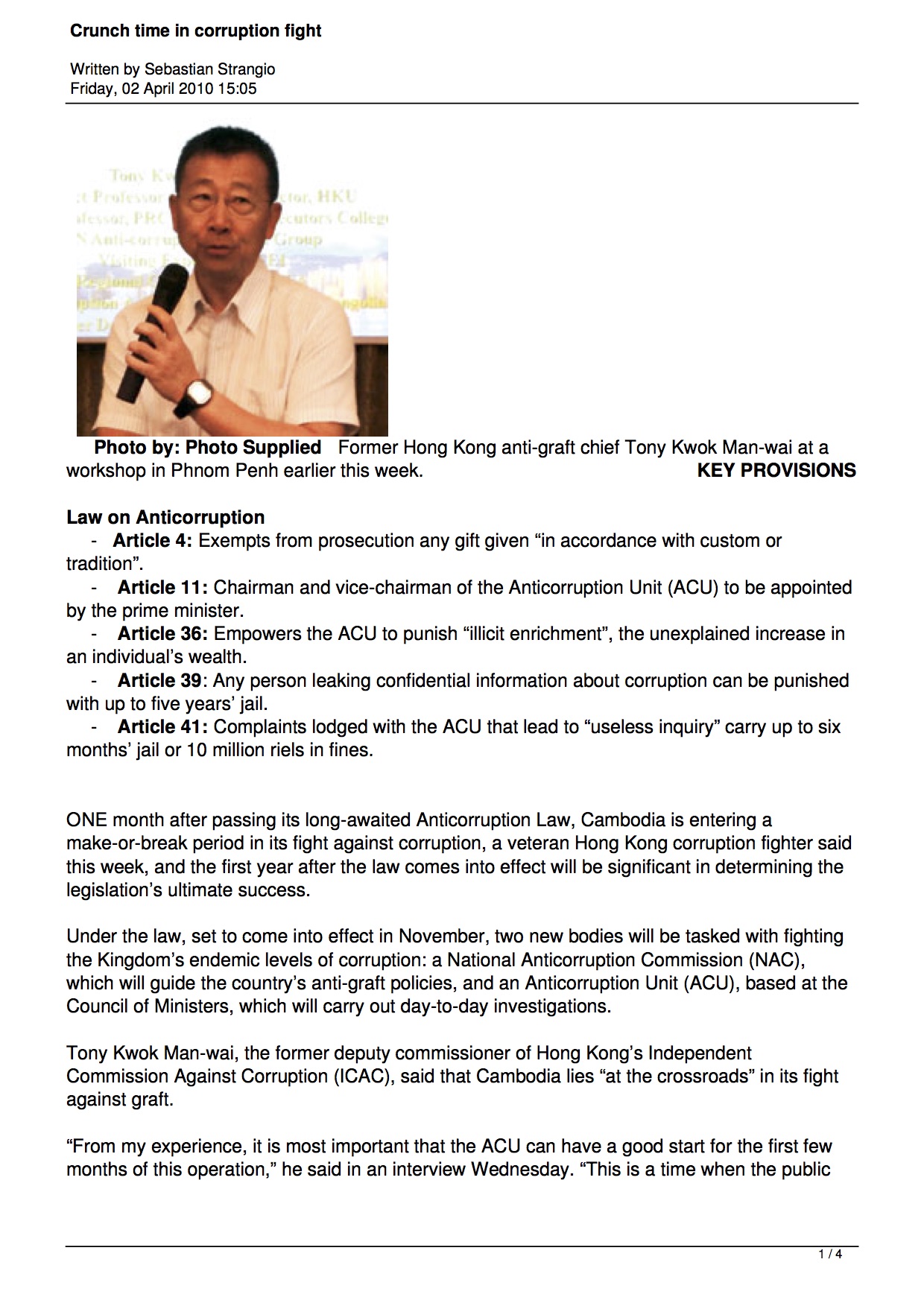
Crunch time in corruption fight
Publication Year: 2010 / Sources: Sebastian StrangioOne month after passing its long-awaited Anticorruption Law, Cambodia is entering a make-or-break period in its fight against corruption, a veteran Hong Kong corruption fighter said this week, and the first year after the law comes into effect will be significant in determining the legislation’s ultimate success.
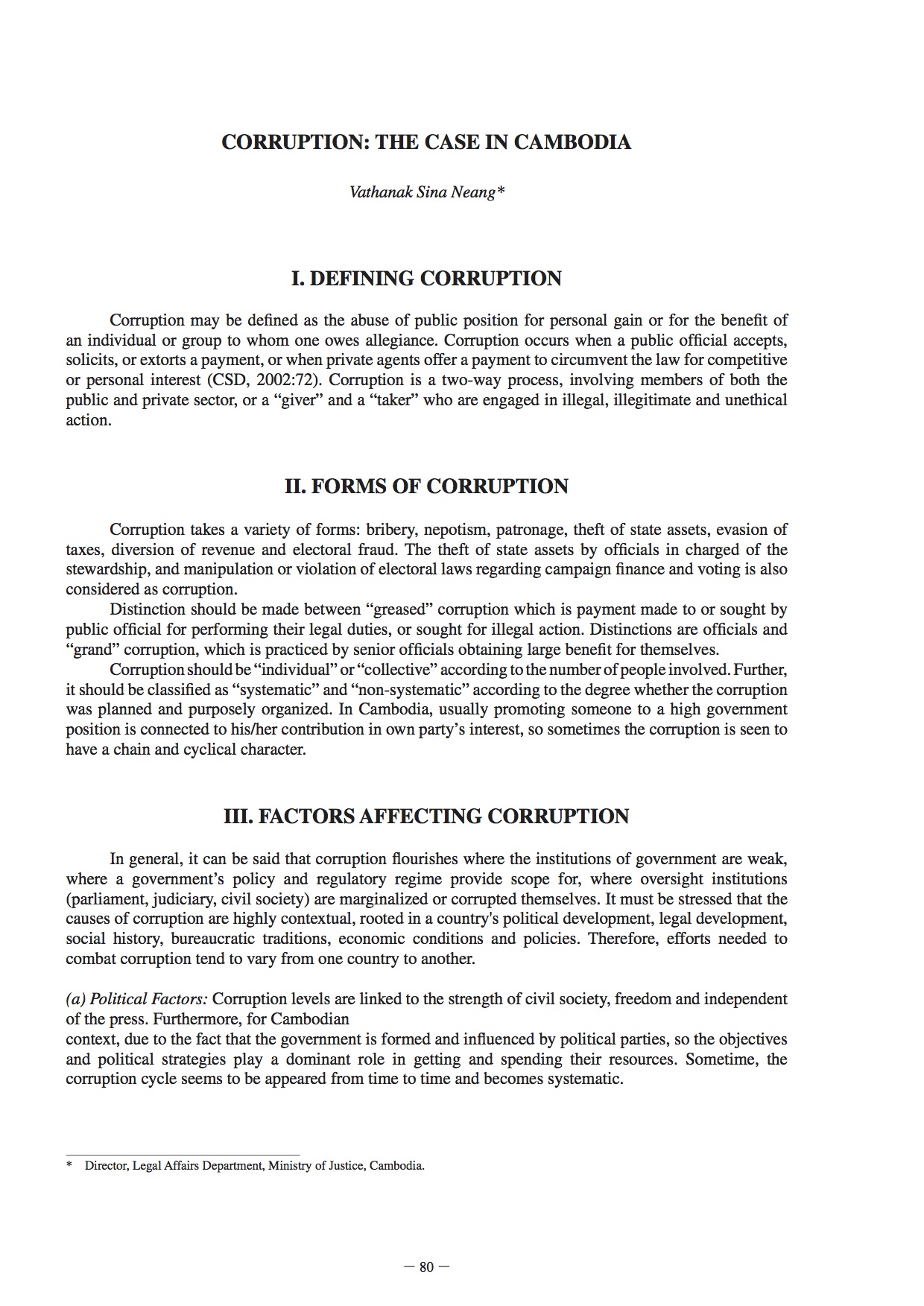
Corruption: The Case in Cambodia
Publication Year: ---- / Sources: Director, Legal Affairs Department, Ministry of Justice, CambodiaThe endemic corruption has severe consequences for the quality of governance and efforts to attain sustainable development. Corruption is a form of public theft. In stead of acting “grease”, corruption serves as a kind of “sand” in the gears of public policy decision-making.
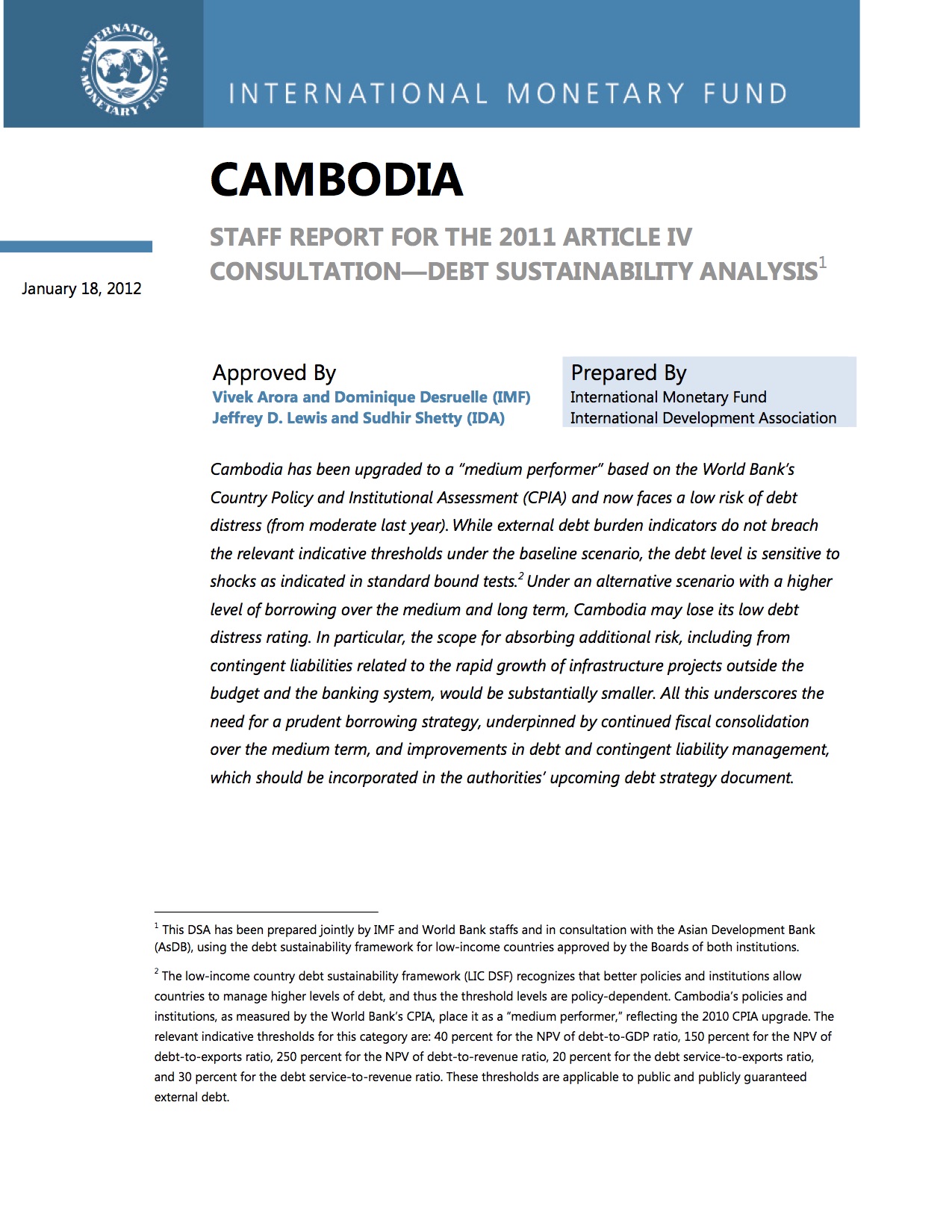
Cambodia Staff Report for the 2011 Article IV Consultation — Debt Sustainability Analysis
Publication Year: 2012 / Sources: International Monetary Fund (IMF)Cambodia has been upgraded to a “medium performer” based on the World Bank’s Country Policy and Institutional Assessment (CPIA) and now faces a low risk of debt distress (from moderate last year). While external debt burden indicators do not breach the relevant indicative thresholds under the baseline scenario, the debt level is sensitive to shocks as indicated in standard bound tests.2 Under an alternative scenario with a higher level of borrowing over the medium and long term, Cambodia may lose its low debt distress rating. In particular, the scope for absorbing additional risk, including from contingent liabilities related to the rapid growth of infrastructure projects outside the budget and the banking system, would be substantially smaller. All this underscores the need for a prudent borrowing strategy, underpinned by continued fiscal consolidation over the medium term, and improvements in debt and contingent liability management, which should be incorporated in the authorities’ upcoming debt strategy document.
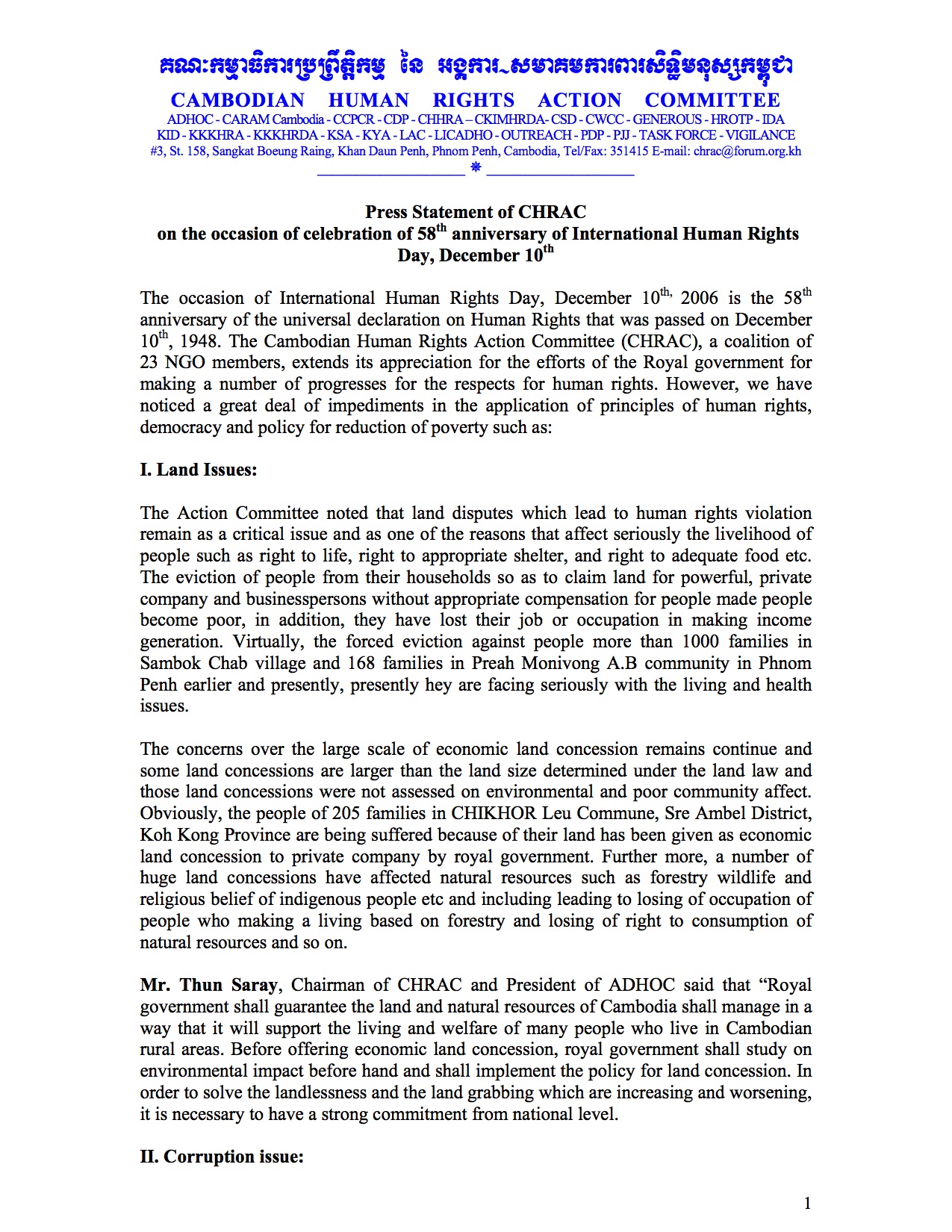
Press Statement of CHRAC on the occasion of celebration of 58th anniversary of International Human Rights Day, December 10th
Publication Year: 2006 / Sources: Cambodian Human Rights Action Committee (CHRAC)The occasion of International Human Rights Day, December 10th, 2006 is the 58th anniversary of the universal declaration on Human Rights that was passed on December 10th, 1948. The Cambodian Human Rights Action Committee (CHRAC), a coalition of 23 NGO members, extends its appreciation for the efforts of the Royal government for making a number of progresses for the respects for human rights. However, we have noticed a great deal of impediments in the application of principles of human rights, democracy and policy for reduction of poverty such as…
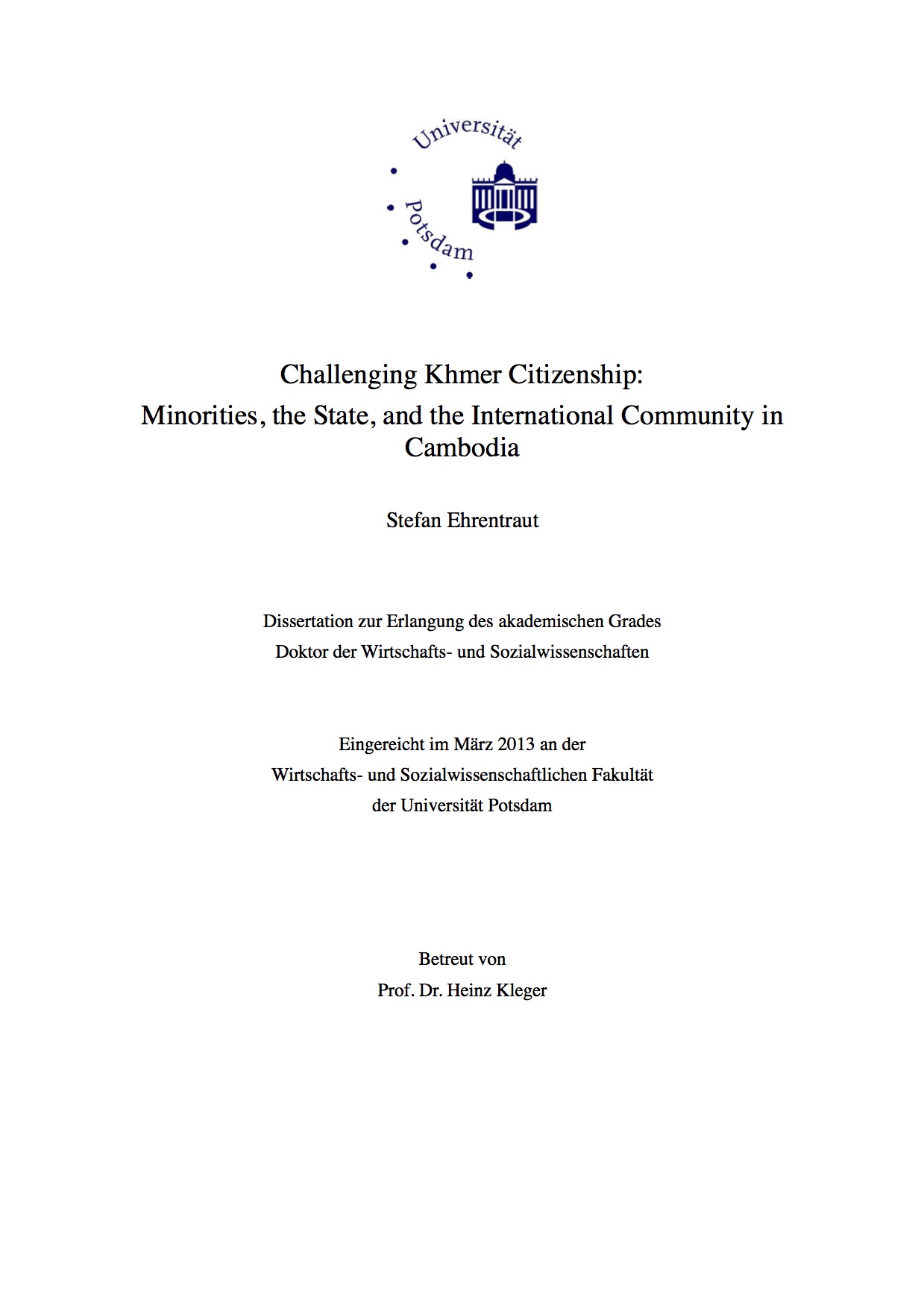
Challenging Khmer Citizenship: Minorities, the State, and the International Community in Cambodia
Publication Year: 2014 / Sources: Institutional Repository of the University of PotsdamThe idea of a distinctly ‘liberal’ form of multiculturalism has emerged in the theory and practice of Western democracies, and the international community has become actively engaged in its global dissemination via international norms and organizations. Liberal multiculturalism defends some forms of minority rights as advancing basic liberal values of individual freedom, democracy, and social justice. The internationalization of liberal minority rights norms faces many challenges. To help identify these challenges, it is useful to focus on one country and one particular interpretation of liberal multiculturalism. To this end, this thesis explores state-minority-relations in Cambodia in light of Will Kymlicka’s theory of multicultural citizenship. Kymlicka’s conception of multicultural citizenship shares many of the basic assumptions of other liberal theorists of multiculturalism and helps making sense of Western multiculturalism as well as of emerging international minority rights norms. Unlike other theorists, Kymlicka has explicitly discussed the potential for adopting liberal multiculturalism in non-Western societies.
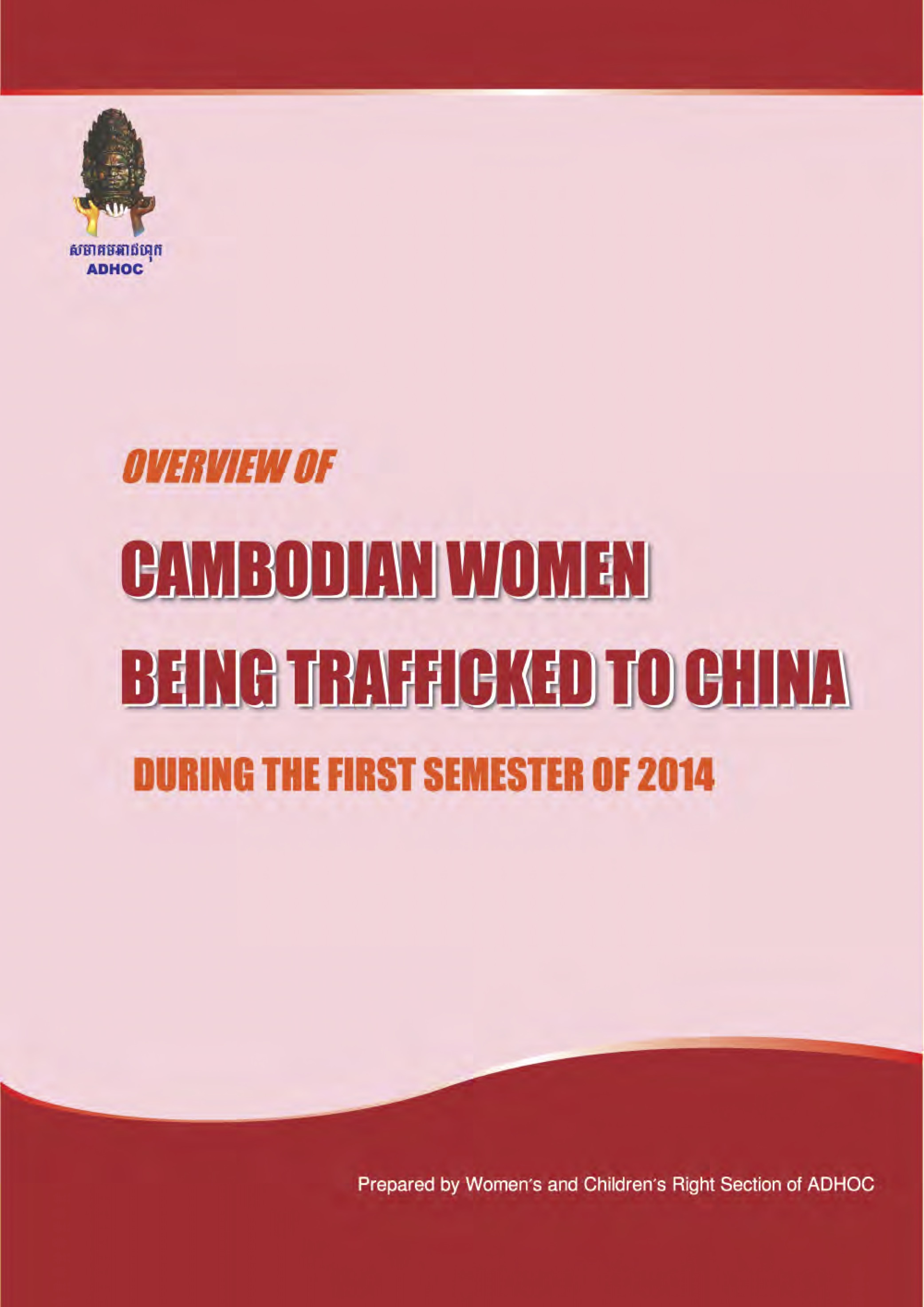
Overview of Cambodian Women Being Trafficked to China
Publication Year: 2014 / Sources: The Cambodian Human Rights and Development Association (ADHOC)In this report ADHOC will details the situation of women and girls trafficked to China in the first half of 2014. This report focuses on complaints received, on investigations done and victim interventions conducted by ADHOC. The report will analyze factors giving rise to human trafficking and several challenges noted based on reports from ADHOC’s 22 field offices and Central Office in Phnom Penh. This report also includes information received from other institutions and organizations working to combat human trafficking.
Download: English | Khmer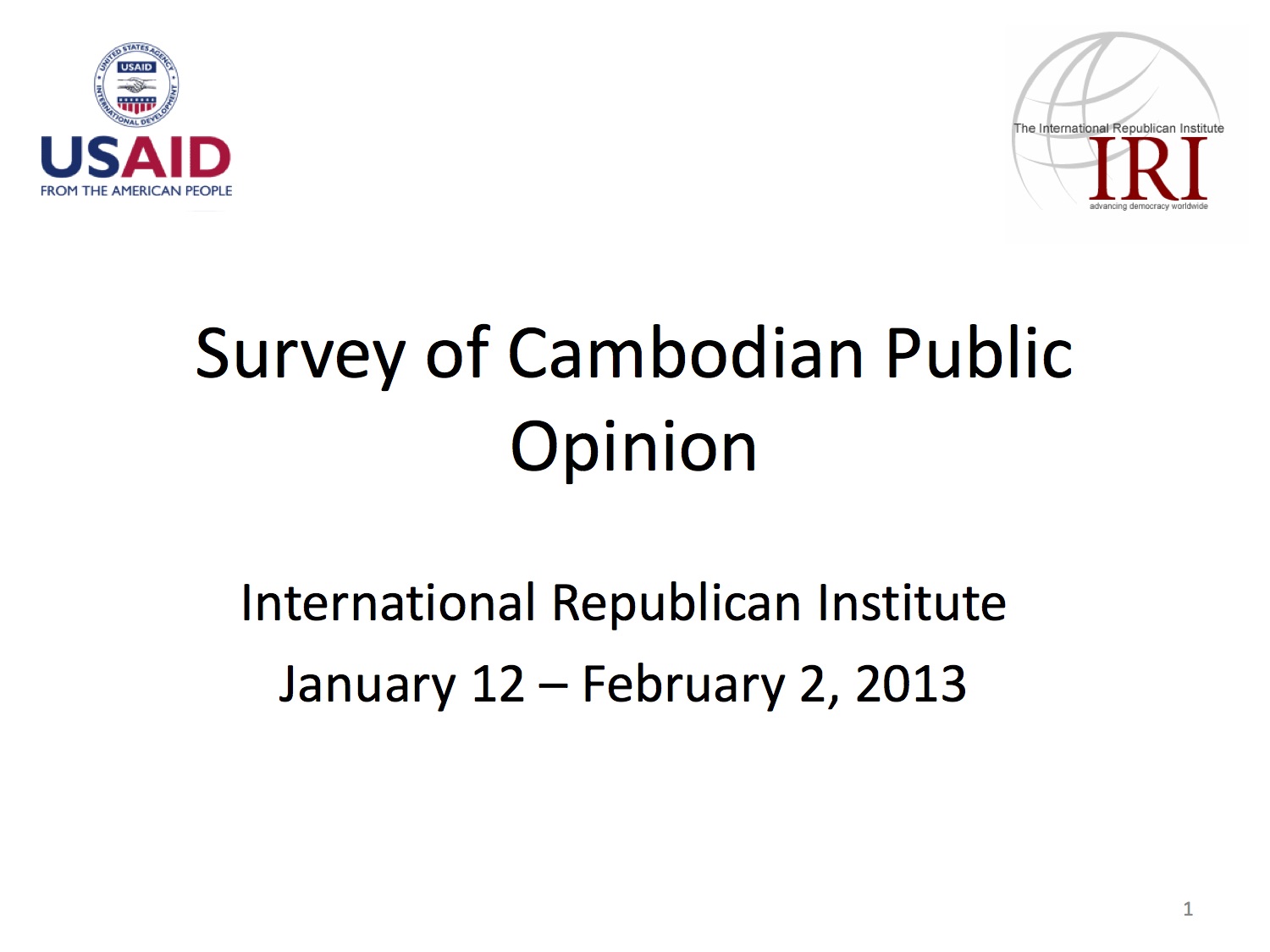
Survey of Cambodian Public Opinion
Publication Year: 2013 / Sources: United States Agency for International Development (USAID), International Republican Institute (IRI)—-
Download: English | Khmer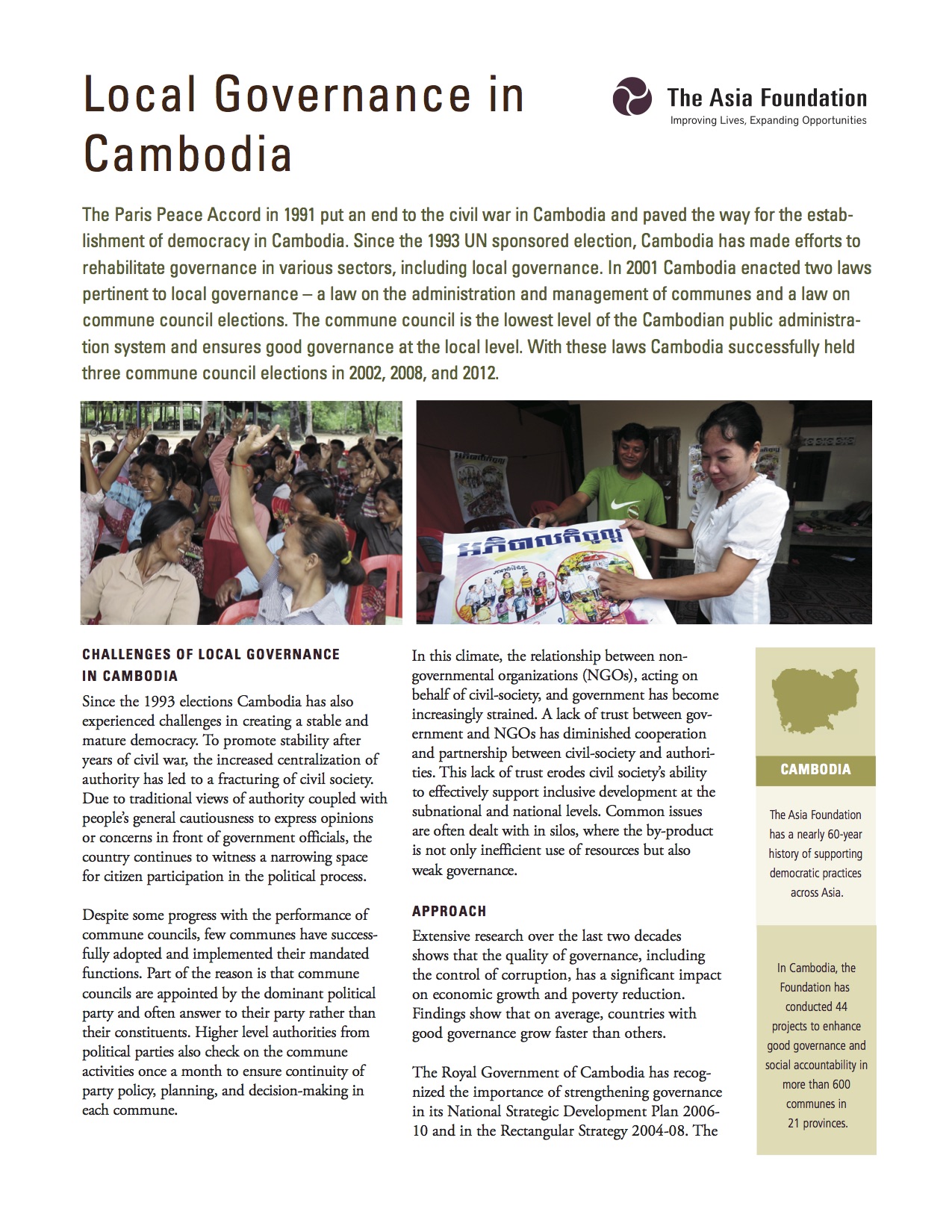
Local Governance in Cambodia
Publication Year: 2013 / Sources: The Asia FoundationThe Paris Peace Accord in 1991 put an end to the civil war in Cambodia and paved the way for the estab- lishment of democracy in Cambodia. Since the 1993 UN sponsored election, Cambodia has made efforts to rehabilitate governance in various sectors, including local governance. In 2001 Cambodia enacted two laws pertinent to local governance – a law on the administration and management of communes and a law on commune council elections. The commune council is the lowest level of the Cambodian public administra- tion system and ensures good governance at the local level. With these laws Cambodia successfully held three commune council elections in 2002, 2008, and 2012.
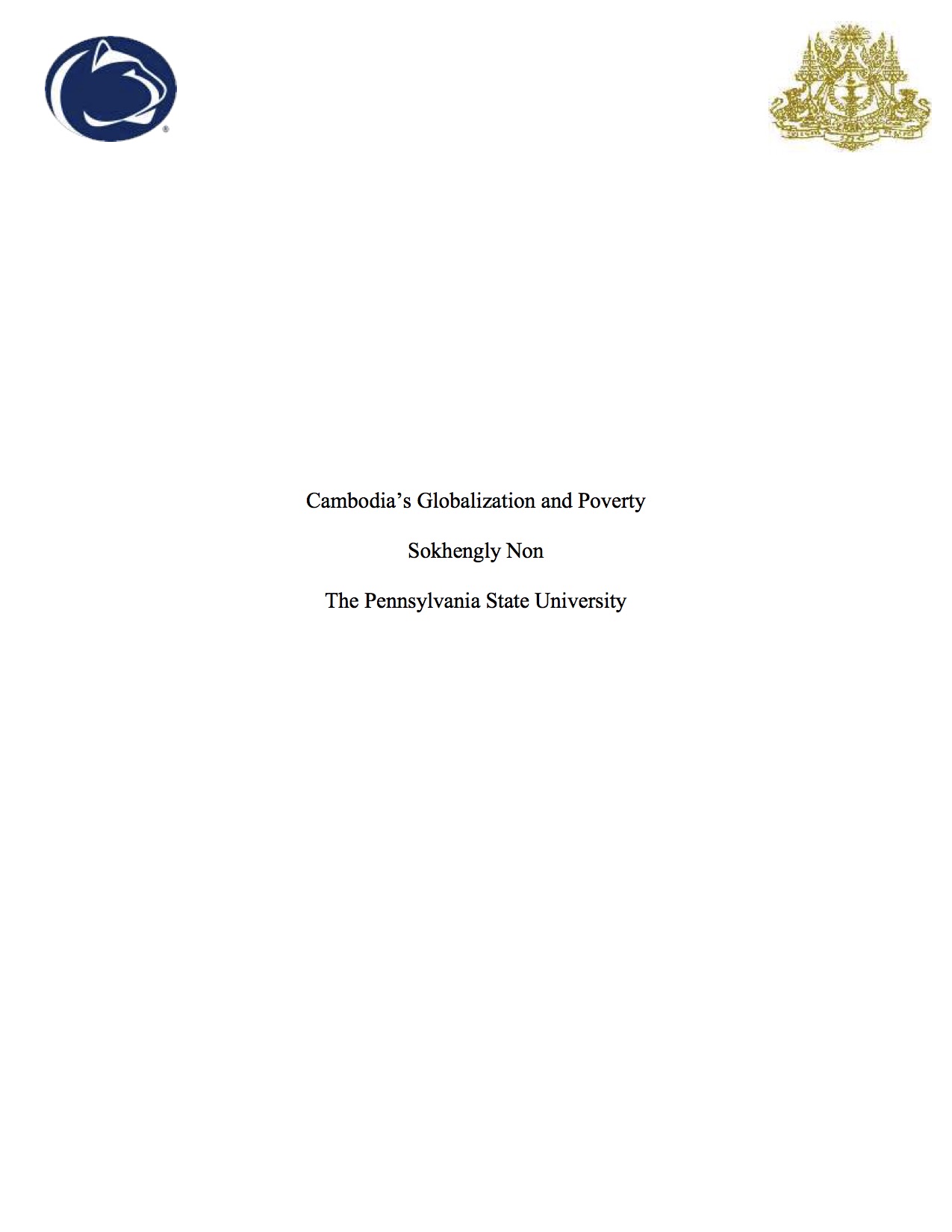
Cambodia’s Globalization and Poverty
Publication Year: ---- / Sources: The Pennsylvania State UniversityIn this paper, I will discuss what effects globalization has had on Cambodia. I will compare the old political system in Cambodia in 1970s to the new system that has evolved since the civil war, and the invasion by Vietnam. This comparison shows the way in which globalization has made Cambodia grow significantly in terms of the expansion in economy, creation more jobs, increased foreign investment and foreign aid. On the other hand, globalization also has impacted Cambodian society by exploiting the Cambodian people in cheap labor forces. There are many international organizations such as UNICEF, UNDP, IMF and World Bank that have provided aid like technical support, grants and loans to help to improve physical structure such as, infrastructure, human resources, and health care in this country.
